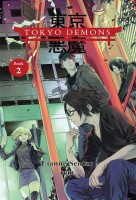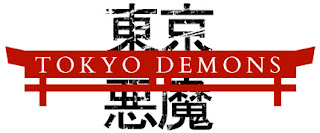 Author: Lianne Sentar
Author: Lianne Sentar
Illustrator: Rem, Romy-chan, Tacto
Publisher: Chromatic Press
ISBN: 9780993861185
Released: February 2016
Ever since reading You’re Never Alone, the first novel in Lianne Sentar’s Tokyo Demons, I have been nearly consumed by everything even tangentially related to the trilogy. I find Tokyo Demons to be remarkably engaging and as the series has progressed I have become increasingly invested in both the story and its characters. Tokyo Demons has a small but very loyal fanbase, so perhaps it isn’t too surprising that it became one of the flagship titles not only for Chromatic Press and the Sparkler Monthly magazine but also for Cherry Bomb, an imprint that provides an opportunity for Sparkler Monthly creators to explore more mature, sexually-charged stories and themes. Know What You Want, released in 2016, is the first Cherry Bomb collection to be compiled. It brings together four Tokyo Demons Cherry Bomb stories–”Building Up,” “Coming Down,” “Never Again,” and “Save Me/Don’t Save Me”–originally published online between 2014 and 2015. The volume also includes illustrations by Rem and Romy-chan and collects “Once,” a related short story previously released in You’re Never Alone, and “Unsaid,” a comic illustrated by Tacto which was created specifically for Know What You Want.
Some of the stories collected in Know What You Want take place before the beginning of Tokyo Demons, effectively serving as prequels, while others actually take place during the events of the main series. Rather than being organized chronologically, the stories are arranged by character beginning with Ayase and Jo who are the two primary point-of-view protagonists of Tokyo Demons. “Building Up” shows Ayase consciously and subconsciously struggling to come to terms with her complicated and conflicted feelings for Kiyoshi while “Coming Down” delves into some of the more unfortunate parts of Jo’s past. The following three pieces–”Once,” “Never Again,” and “Save Me/Don’t Save Me”–form a triptych which turns to Sachi, a somewhat unexpected Tokyo Demons fan favorite, and more specifically to the shifting dynamics of his relationship with Kadoyuki. (Appropriately enough, Sachi is also the character featured on the collection’s front cover.) Know What You Want closes with “Unsaid” which examines Miki, another member of the series’ extended cast, and the painful ramifications of his devotion to Mitsuko.
 Know What You Want epitomizes what Cherry Bomb is all about. The content is mature but it has purpose and meaning behind it. While there is sex, the real focus is on the characters and their relationships with themselves and with one another. The stories collected in Know What You Want provide additional background details and greater insight into the characters and story of Tokyo Demons. The situations portrayed are alluded to within the novels, but reading Know What You Want isn’t at all necessary to understand the main series. Readers who aren’t interested in erotica can still enjoy Tokyo Demons without needing to delve into Know What You Want, but those who are will discover that the collection expands and deepens the already impressive characterization and worldbuilding present in the trilogy. To varying degrees, all of the stories in Know What You Want can stand on their own satisfactorily, but the collection is really intended for people who have read and who are familiar with Tokyo Demons–the stories lose some of their impact and underlying meaning if removed from the context of the series as a whole.
Know What You Want epitomizes what Cherry Bomb is all about. The content is mature but it has purpose and meaning behind it. While there is sex, the real focus is on the characters and their relationships with themselves and with one another. The stories collected in Know What You Want provide additional background details and greater insight into the characters and story of Tokyo Demons. The situations portrayed are alluded to within the novels, but reading Know What You Want isn’t at all necessary to understand the main series. Readers who aren’t interested in erotica can still enjoy Tokyo Demons without needing to delve into Know What You Want, but those who are will discover that the collection expands and deepens the already impressive characterization and worldbuilding present in the trilogy. To varying degrees, all of the stories in Know What You Want can stand on their own satisfactorily, but the collection is really intended for people who have read and who are familiar with Tokyo Demons–the stories lose some of their impact and underlying meaning if removed from the context of the series as a whole.
The Tokyo Demons Cherry Bomb stories have been affectionately termed miserotica by both their creators and fans and rightfully so. Know What You Want is an intentionally uncomfortable, heartwrenching, and heartbreaking collection. Many of the characters in Tokyo Demons are teenagers who come from broken or nearly nonexistent families and homes. They are young, awkward, and apt to make terrible but well-meaning decisions in their social and emotional immaturity. While they are strong in some ways they are fragile in others, understandably desperate for and terrified of intimacy and human connection. The characters of Tokyo Demons are all incredibly well-developed and relatable, but it’s Sachi with his heightened empathy who tends to be the character with whom I most personally resonate. Partly because of this, the fraught relationship between Sachi and Kadoyuki is one of my favorites in the series, so I’m happy to see it receive so much attention in Know What You Want. “Save Me/Don’t Save Me” is a particularly powerful and moving piece (I have honestly cried every time that I’ve read it), but the entire collection is a provocative exploration of the complexities of love, longing, and acceptance.




